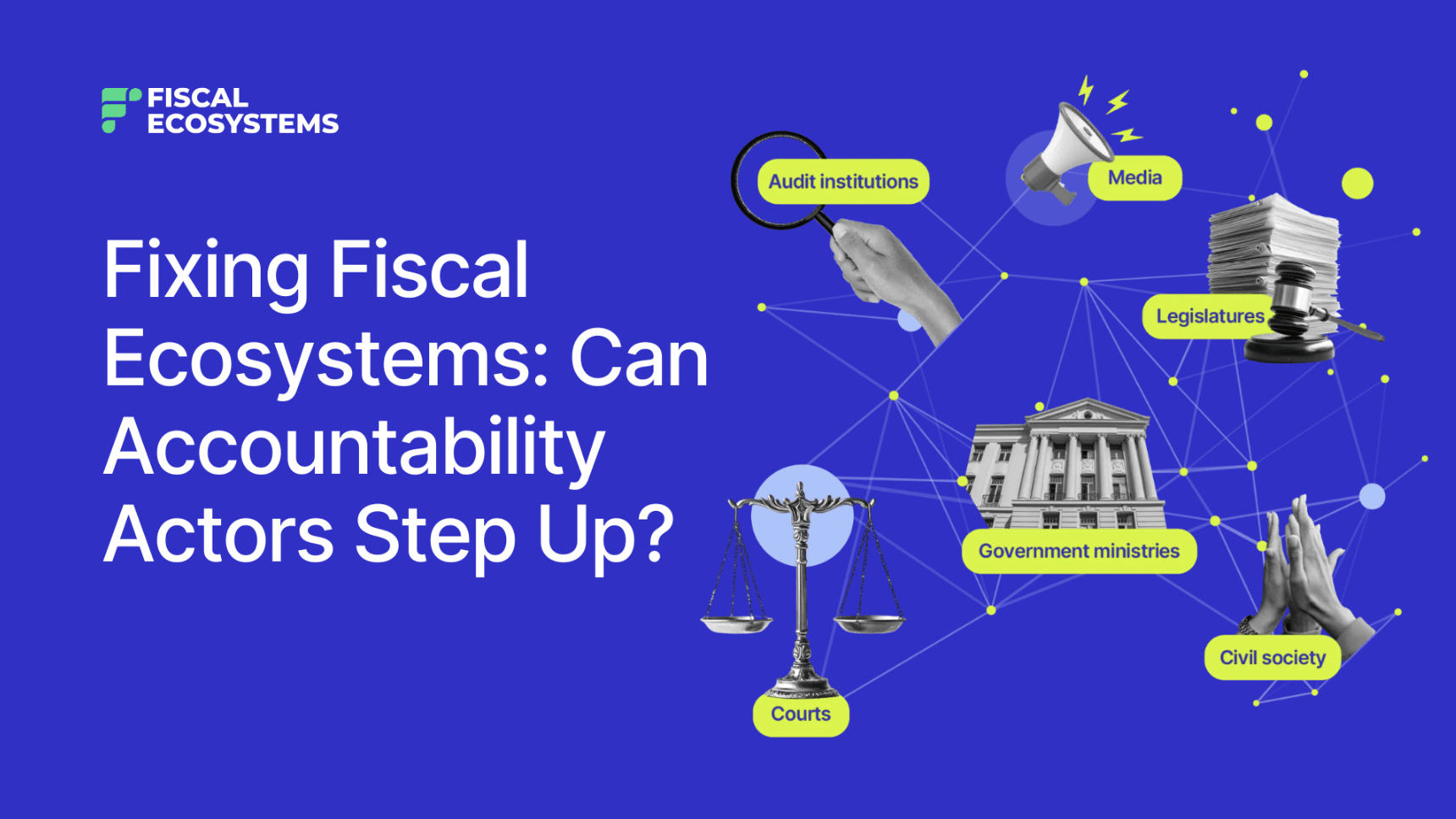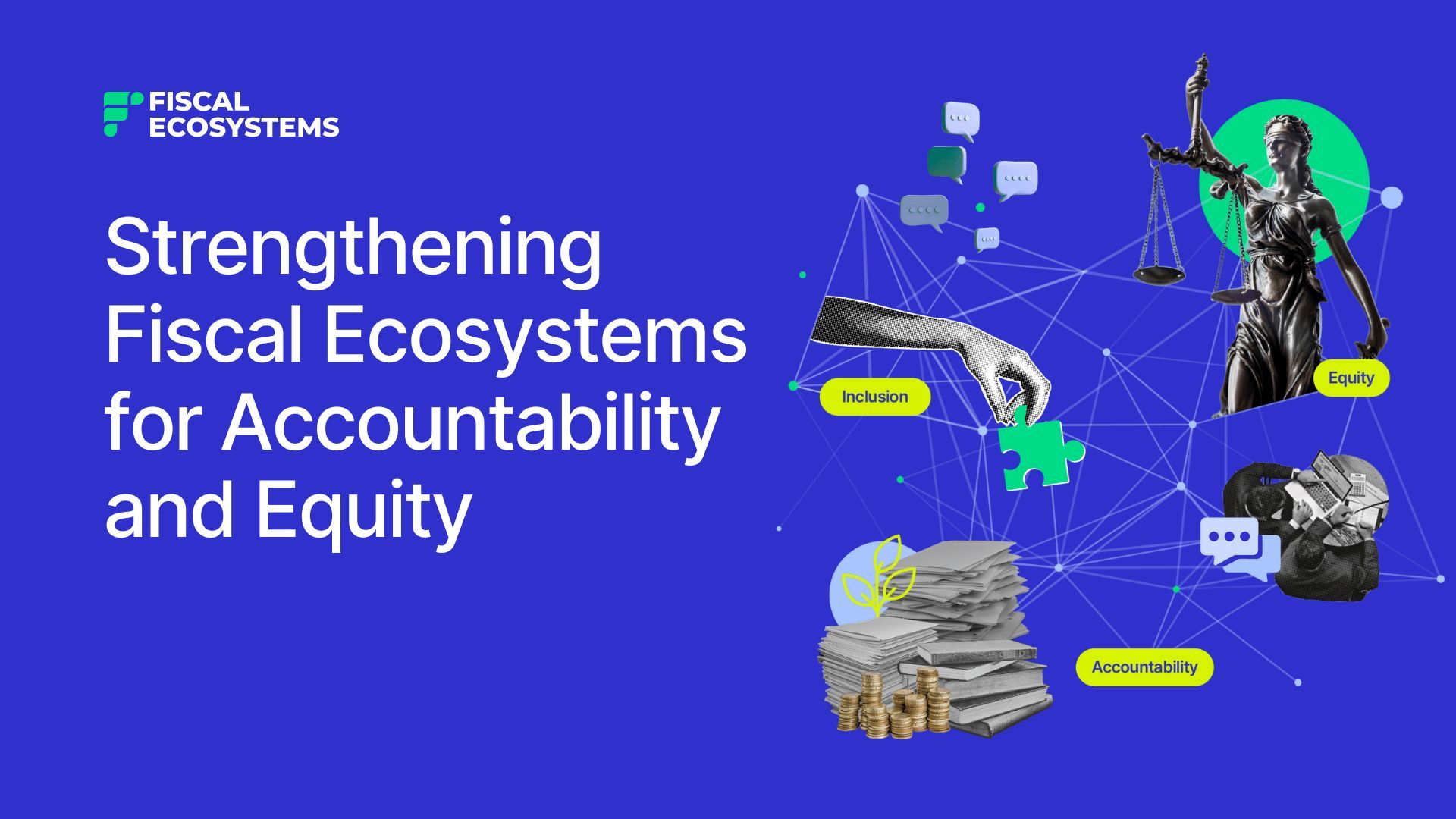
Whyfiscalecosystemsmatter?
Public finance decisions are not shaped by any single institution. They emerge from the interactions of many interconnected networks and actors, both domestic and international. An ecosystem approach looks at how these actors - ministries, parliaments, audit bodies, business, donors, and others - connect, influence one another, and share power. By focusing on these relationships, incentives, and dynamics, the approach helps to identify strategic leverage points and coalitions that move beyond piecemeal reforms to drive system-wide change.
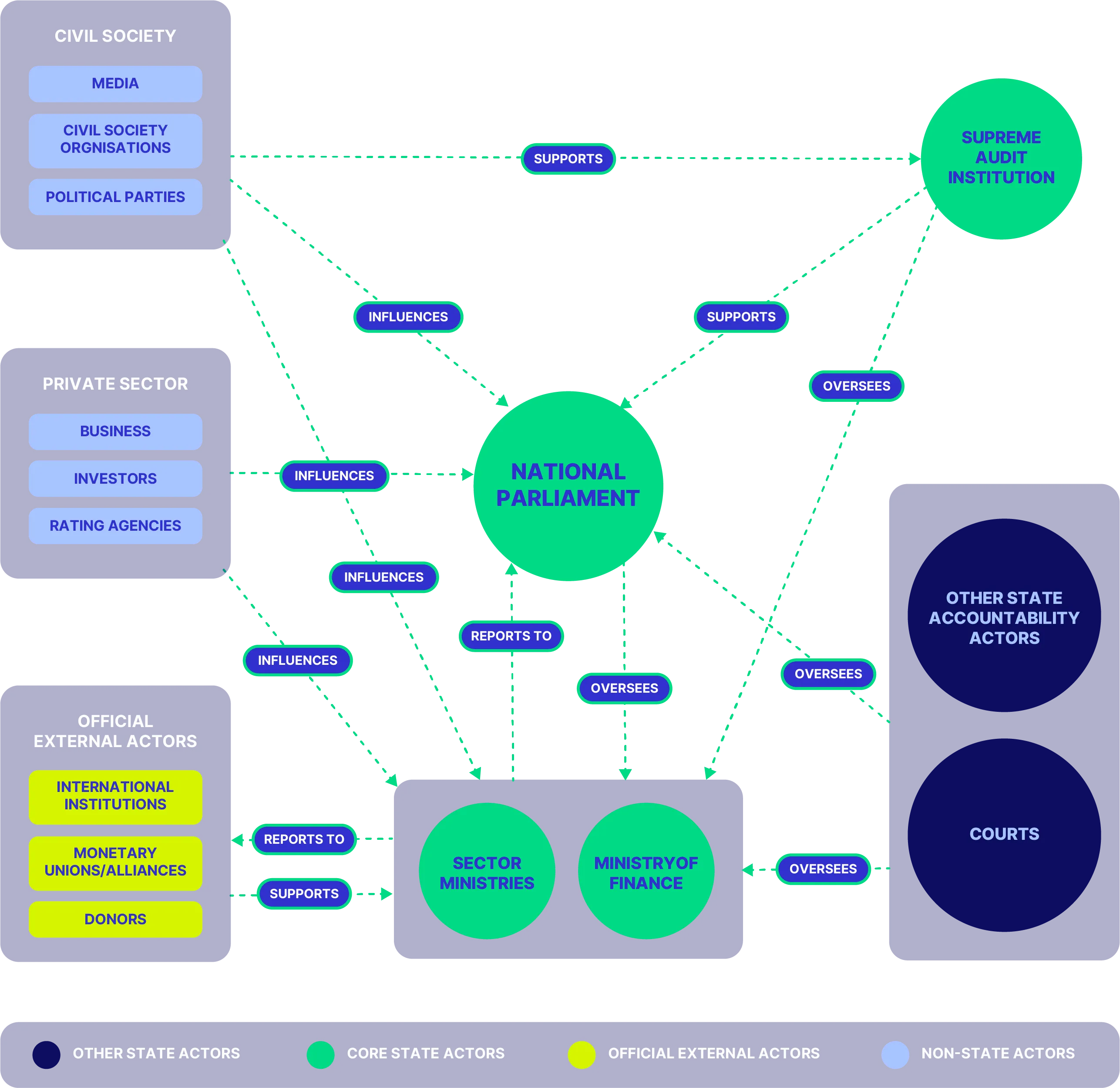
This graphic provides a simplified view of the political economy relationships within a typical fiscal accountability ecosystem. The project will use this approach to map the roles and relationships of key actors in the system. It serves as a starting point to compare how the system is designed to function in law versus how it operates in practice, and to identify potential entry points for strengthening accountability and equity.
Fiscalecosystemproject
The project combines in-depth research to map accountability ecosystems in Brazil, Indonesia, and South Africa, with a global convening to build knowledge and institutional commitment to reform. Led by country experts and supported by international institutions, the project aims to build a global learning coalition to identify and test practical strategies for strengthening fiscal systems and accountability and equity.
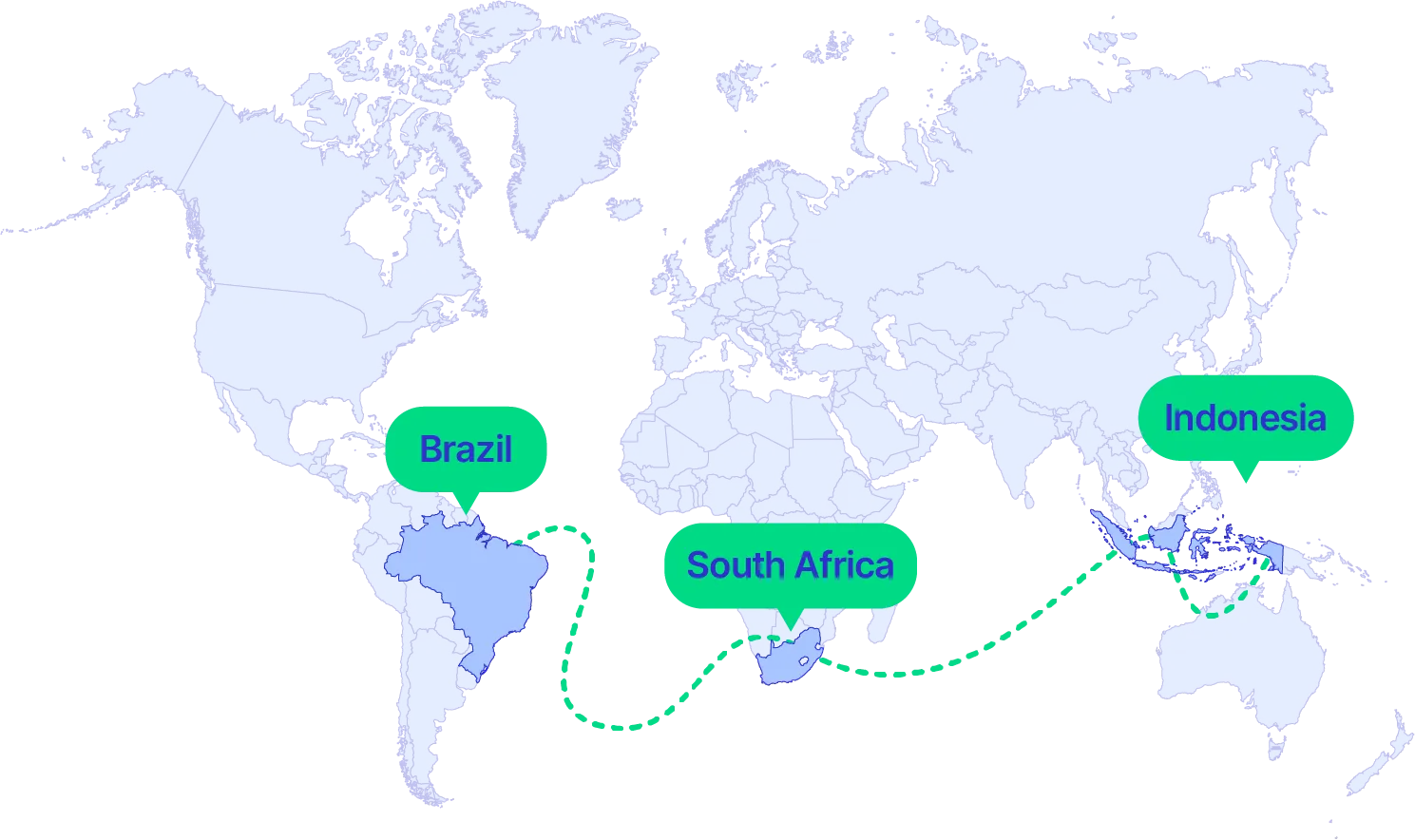
Whatisthevalueaddedoftheproject?
Public finance reforms traditionally focus on strengthening individual institutions, especially Ministries of Finance. This project introduces an ecosystems perspective to examine how the growing diversity of fiscal actors interact to shape public finance decisions. By unpacking these relationships and the political dynamics behind them, the project seeks strategic insights into how accountability and equity can be advanced. It will also convene country and international practitioners to share lessons and identify paths for system-wide improvement.
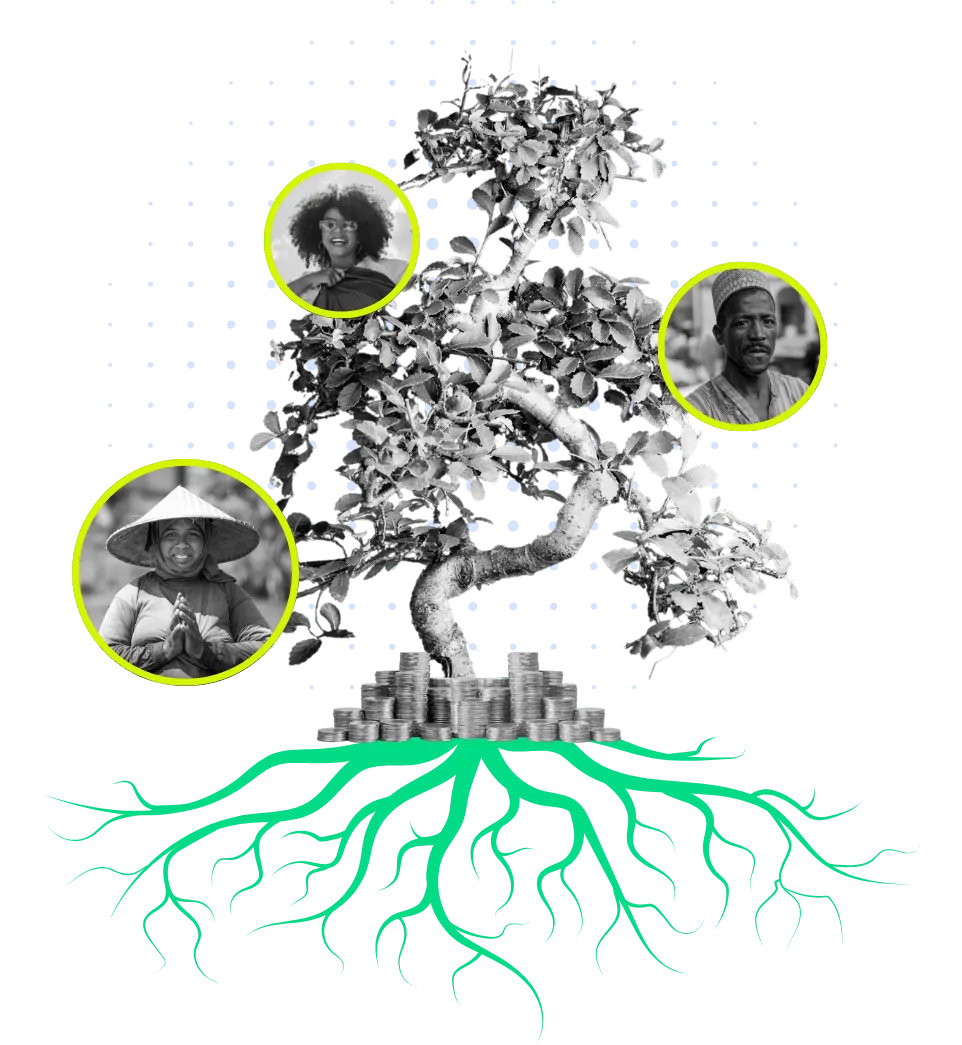
International Dialogue
In September 2025, a global convening will bring together key stakeholders
from parliaments, SAIs, civil society, media, finance ministries, and
international organizations to explore strengthening fiscal ecosystems. In
partnership with Reos Partners, experts in dialogue and systems change,
this event will launch a global learning coalition focused on innovation,
data-driven insights, and impactful strategies.
As the dialogue approaches, we will share background papers and blogs that
will inform the discussions. Once the dialogue concludes, we will share the
participants, a summary of the discussions, the emerging recommendations, an
action plan to take this work forward.
Resources
Explore our reports and insights on strengthening fiscal ecosystems. Our country studies focus on Brazil, Indonesia, and South Africa, offering in-depth analysis through a political economy lens. Each study answers key questions about the evolution, functioning, and reform strategies of fiscal ecosystems, with a look at promising change. Access both the full reports and blogs through the links below.
All the resources → ProjectTeam
Behind the Fiscal Ecosystems Project is a team of strategists, policy experts and facilitators working to strengthen fiscal transparency and accountability worldwide. We bring together deep expertise in governance, philanthropy, and international development, along with a shared commitment to elevating civil society voices and advancing equitable fiscal systems.
-
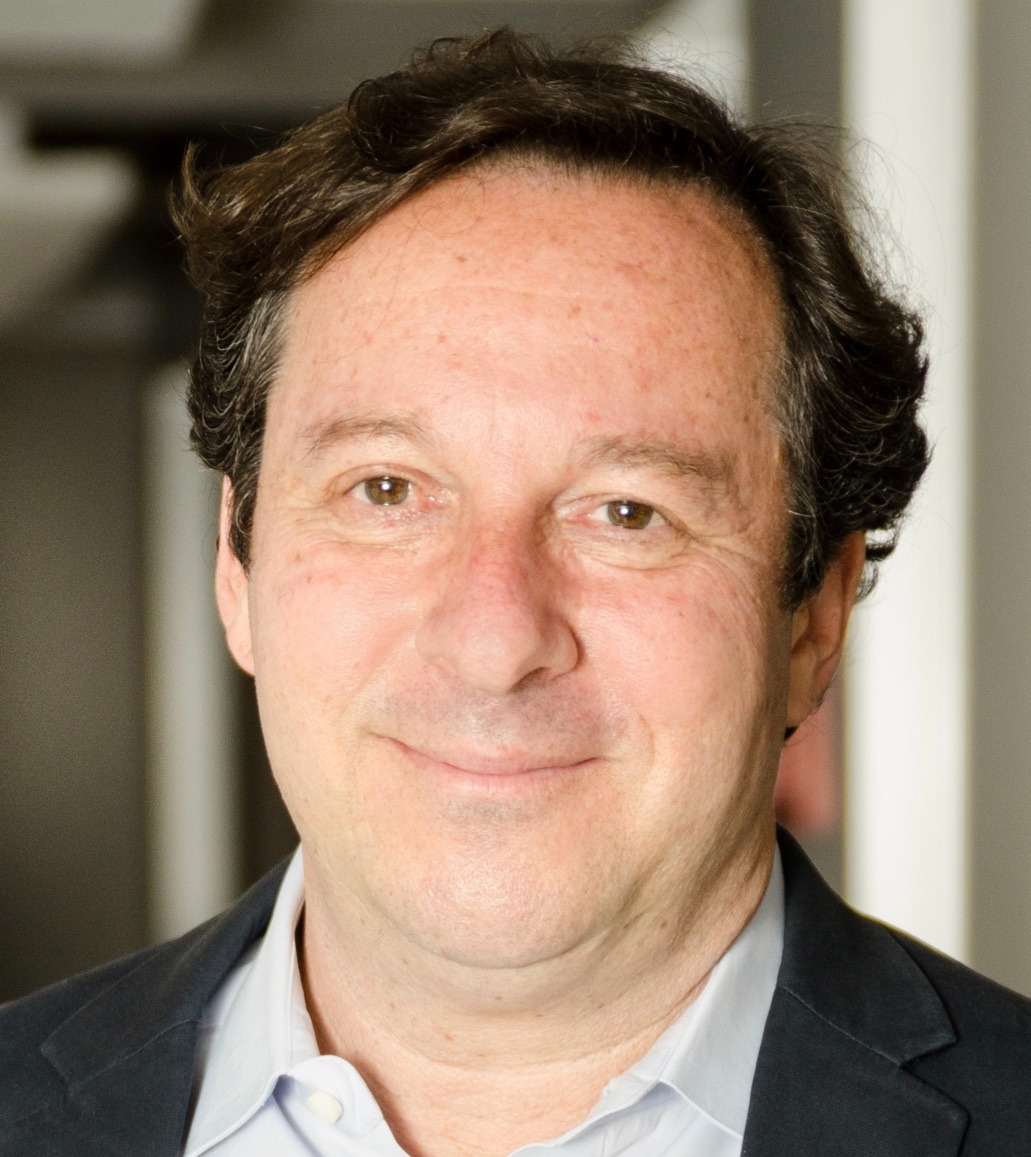
Warren Krafchik
Project Leader
Warren Krafchik was the founding Executive Director of the International Budget Partnership. He was also a co-founder and the first civil society co-chair of the Open Government Partnership (OGP); and co-founder of the Global Initiative for Fiscal Transparency (GIFT.) He is a South African economist who has written and worked extensively in the fields of macro-economics, public finance, and governance for the past 30 years.
-
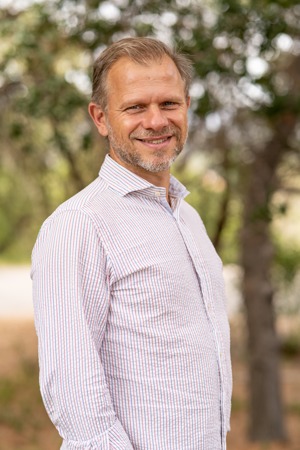
Paolo de Renzio
Project Leader and Brazil Country Researcher
Paolo de Renzio is a public finance practitioner and scholar based in Rio de Janeiro, with more than 25 years of experience working on public finance reforms with various institutions across a number of countries. He is Senior Lecturer at the Brazilian School of Public and Business Administration of Fundação Getulio Vargas (FGV/EBAPE) and holds a regular visiting faculty position at the London School of Economics and Political Science. Paolo holds a Ph.D. from the University of Oxford, an MSc from the London School of Economics, and a Bachelor’s from Bocconi University in Milan, Italy.
-
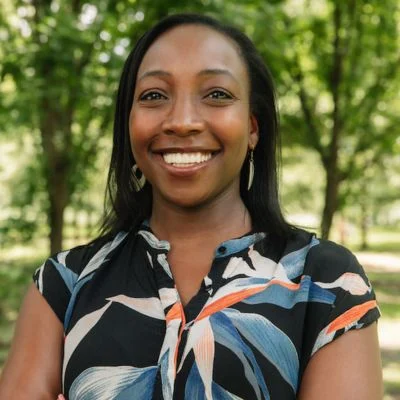
Karimi Foundaumiere
Project Facilitator and Senior Associate at Reos Partners
Karimi Foundaumiere has experience leading teams and facilitating systems change processes in the financial services sector, oil and gas industry, and social development. Her areas of expertise include: strategy, consulting, leadership, social impact and coaching for teams and individuals. Her project experience at Reos includes project lead for the UNAIDS ESA Regional Country Meeting, Anglo American Plats GBV, and facilitating the Heifer International Project. As part of Reos’ growth and development of internal systems and protocols, Karimi has led on the advancement of Reos project management practices, the implementation of best practices in reporting and monitoring project activities and spending. Her mission in life is to serve the world by creating spaces where growth thrives and meaningful changes are catalysed.
-
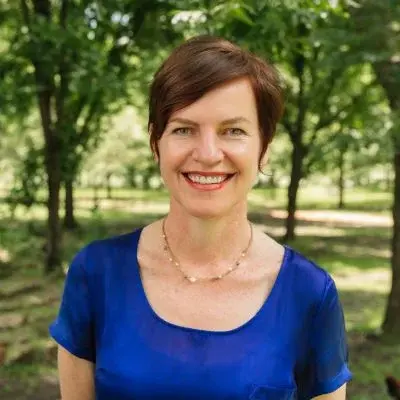
Colleen Magner
Project Facilitator and Co-founder and Director of Innovation and Practice of Reos Partners
Is co-founder of Reos Partners and previously served as the Managing Director for the Africa office. Her new role as Director of Innovation and Practice will focus on evolving Reos’ offerings to amplify impact. Colleen is a scenario planning expert and has led a number of transformative scenario planning processes around the world. Her experience includes convening, organising, and facilitating short- and long-term relationships across sectors to address their most pressing challenges—from violence against women to climate change adaptation in vulnerable parts of the African continent. She is also a writer and co-author of Mapping Dialogue: Essential Tools for Social Change, which outlines a variety of transformative dialogue tools and change processes. Colleen was project lead on the Southern Africa Food Lab project and on Land Reform Futures and was lead facilitator for the Scenarios for the future of the Northern Mozambique Channel.
-
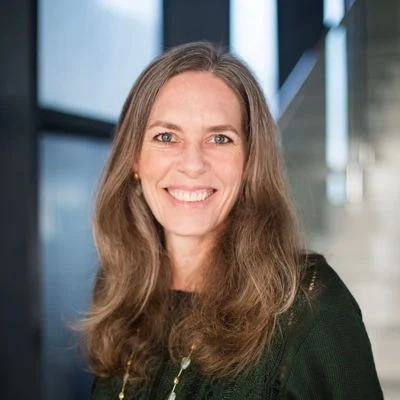
Christel Scholten
Project Facilitator and Managing Director Brazil Team at Reos Partners
Christel Scholten leads the Brazilian team of Reos Partners and is committed to contributing to a more equitable, regenerative and sustainable world. With over 20 years of experience in sustainable development in both corporate and non-profit environments and in different regions, Christel brings a systemic perspective and understanding to her work, supporting groups to identify and collaborate around key leverage points for transformation. She designs, facilitates and supports systems transformation processes with organizations and multi-stakeholder groups. She is passionate about and committed to continuing to deepen her facilitation practice, creating an enabling environment for inclusion and collaboration. Key projects she has led or contributed to in Brazil include the Sustainable Fashion Collaboration, Sustainable Amazon Forum and the Brazil Education Scenarios.
-
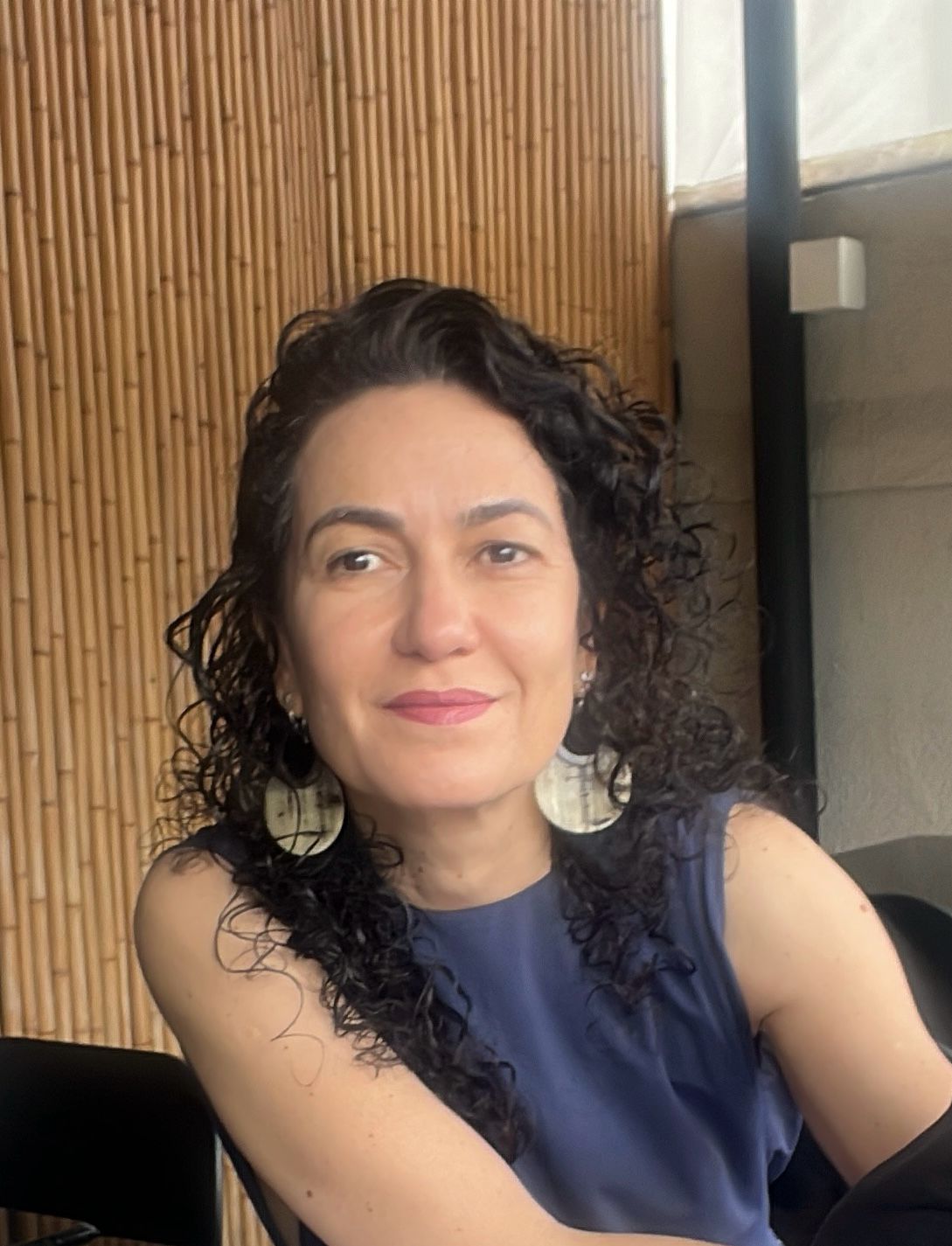
Ursula Peres
Brazil Country Researcher and Associate Professor at the University of São Paulo
Ursula Peres holds a degree in public administration from the Getúlio Vargas Foundation School of Administration in São Paulo (FGVSP) and a master's and doctorate in economics from EESP FGVSP. She is an associate professor in the Public Policy Management programme at the School of Arts, Sciences and Humanities at the University of São Paulo (EACH/USP) and in the postgraduate programmes in Public Policy and Political Science, both at USP. She is a researcher at the Centre for Metropolitan Studies (CEM/USP) and the Interdisciplinary Observatory of Public Policy (OIPP/USP) and has been a visiting researcher at Sciences Po (Paris) and King's College London. She has experience in the area of Public Administration with an emphasis on public finance and public budgeting. She was Director of Budget at the São Paulo Finance Secretariat and Deputy Secretary of Planning, Budget and Management for the Municipality of São Paulo. She is a member of the Extraordinary Federal Budget Council at the Ministry of Planning and Budget.
-
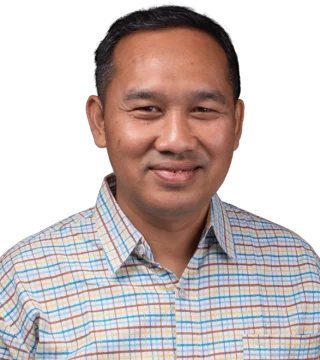
Donny Setiawan
Indonesia Country Reseracher and Program Manager at the International Budget Partnership Indonesia
Donny Setiawan, is a Program Manager at the International Budget Partnership (IBP) Indonesia. Prior to joining IBP in September 2019, he was the Executive Director of INISIATIF for 11 years. Under his leadership, INISIATIF grew up as one of the prestigious NGO who work on budget and public policy in Indonesia. He also has many experiences in conducting research and advocacy on public policy and budget in various sectors (e.g., health, education, water and sanitation, natural resources, poverty alleviation, etc). Donny holds Master’s degree in Urban and Regional Planning at the School of Architecture, Planning, and Policy Development - Bandung Institute of Technology.
-
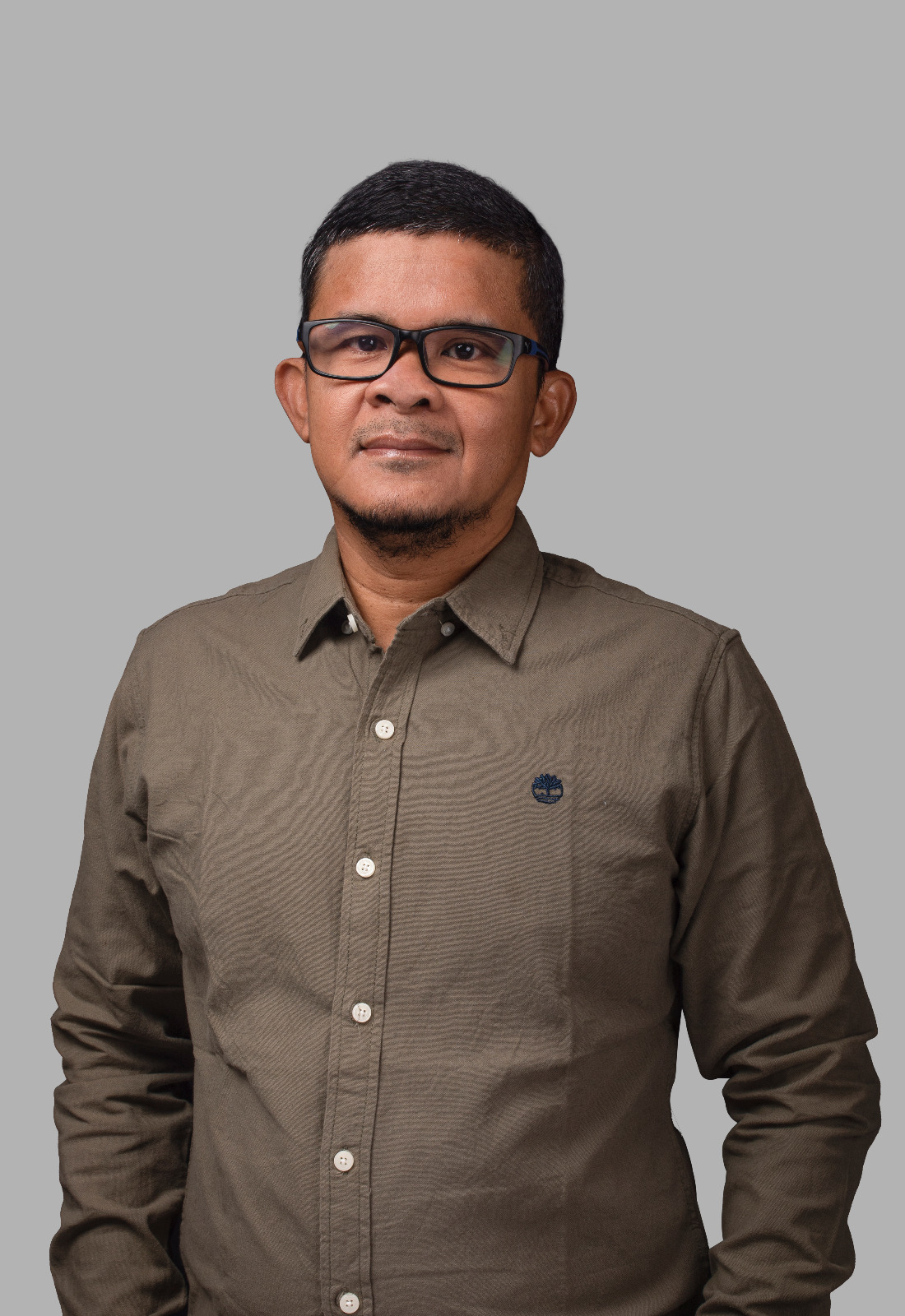
Yuna Farhan
Indonesia Country Researcher and Country Director at the International Budget Partnership Indonesia.
Yuna Farhan is the Country Director for Indonesia at the International Budget Partnership (IBP), a role he has held since February 2019. Prior to joining IBP, he served as a Budget Specialist in the Office of the President of Indonesia. With over 20 years of experience in budget advocacy and reform, Yuna previously led the Indonesia Forum for Budget Transparency (FITRA) as Secretary General, where he advanced sector-specific budget work and established a national budget resource center. He holds a PhD from the University of Sydney, completed in 2018.
-
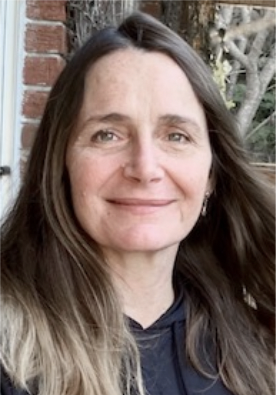
Alta Fölscher
South African Country Researcher and International Public Finance Consultant
Alta Fölscher has 25 years’ research and consultancy experience on public budgeting, financial management and governance. Her portfolio includes in- and cross-country research on fiscal transparency, social accountability, the budget process, thematic budgeting, putting aid on budget, and sector and cross sector public finance reviews. She has provided technical assistance to governments in Africa, South-East and Central Asia, Eastern Europe, the Caribbean and the Middle East. Alta holds an MSc Public Policy and Management, CeFIMS, from the University of London SOAS (2004).
-
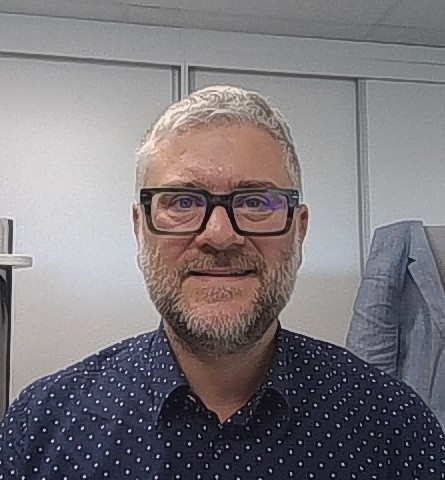
Michael Sachs
South African Country Researcher and Independent Consultant
Michael Sachs has worked for many years in public policy and political strategy in South Africa, as well as international development finance. He is a former head of the budget office at the National Treasury. Before this, he was based at the national headquarters of the African National Congress, where he coordinated economic policy and led the party’s research agenda

